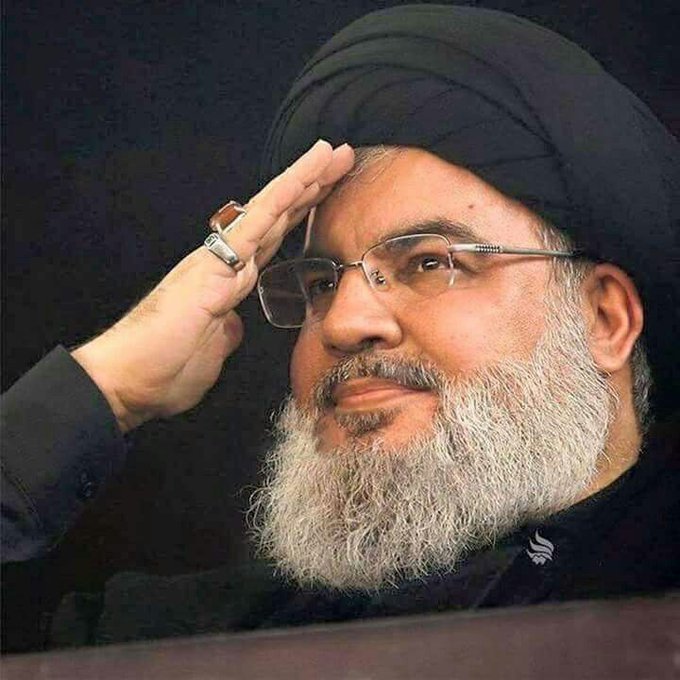Nasrallah: Supreme leader of Iran, Khamenei declares 5 days of mourning

Sayyid Hassan Nasrallah was martyred while busy making plans for defending the defenseless people of Beirut’s Dahiya neighborhood – the same way for tens of years he had planned, strategized, and fought for the oppressed people of Palestine & their occupied cities & villages
Admin I Saturday, Sept 28, 2024
IRAN – The Supreme Leader of Islam, Sayyid Ali Khamenei has declared five days of mourning following the assassination of Hezbollah Secretary General, Sayyed Hassan Nasrallah in Israeli air strikes in Dahieh, Beirut, Lebanon.
Nasrallah was in the command and intelligence headquarters of the organisation when Israel pummeled the establishment with bunker buster bombs capable of penetrating deep into the soil including concrete walls before exploding, creating impacts beyond the area.
” I have declared 5 days of mourning in Iran”, he said and offered his condolences to friends and associates of the Hezbollah leader.
“I offer my condolences & congratulations to the honorable father, wife & children of our dear Sayyid, families of the martyrs, members of Hezbollah, Lebanon’s people & high-ranking officials & entire Resistance Front & Islamic Ummah on martyrdom of Sayyid Nasrallah & his companions”, he said.
He said Sayyid of the Resistance wasn’t just one person.
“He was a path and a school of thought, and his path will continue.
“Sayyid Abbas Mousavi’s blood that was spilled on the ground wasn’t without an effect & the same will be true about that of Martyr Sayyid Hassan.
“The foul-natured Zionist regime has not become victorious by carrying out this atrocity”
It appears he anticipated his own death when he declared:
“I may not stay among you for a long time. Procedures have been devised so that we are prepared. Even if we are all martyred, even if our homes are destroyed over our heads, we will never abandon the option of Islamic resistance”, he said.
According to him, by the grace and power of God, the blows struck by the Resistance Front on the worn-out, deteriorating body of the Zionist regime will become even more crushing.
“The foundation that Sayyid Hassan Nasrallah established in Lebanon and the direction he provided to other centers of Resistance will not be destroyed as a result of his martyrdom, but rather it will also be strengthened due to his sacrifice and that of the other martyrs.
“The Islamic world has lost a noble figure, the Resistance Front has lost an eminent standard-bearer, and Lebanon’s Hezbollah has lost an unparalleled leader. However, the blessings from Sayyid Hassan Nasrallah’s decades of planning and jihad will never be lost.
“Sayyid Hassan Nasrallah was martyred while busy making plans for defending the defenseless people of Beirut’s Dahiya neighborhood – the same way for tens of years he had planned, strategized, and fought for the oppressed people of Palestine & their occupied cities & villages”, he said, adding “The great Mujahid, the standard-bearer of Resistance in the region, a virtuous scholar of religion & a wise political leader – Sayyid Hassan Nasrallah (may God be pleased with him) – achieved martyrdom in last night’s tragic events in Lebanon & has ascended to the the heavens”.
The Hezbollah Leader, Hassan Nasrallah
Hezbollah leader, Hassan Nasrallah is a highly controversial political and military. He assumed leadership of the organisation in 1992.
During this period, Nasrallah has steered the organization through pivotal moments in Lebanon’s history, leaving an indelible mark on the region’s geopolitical landscape.
Nasrallah’s early life was marked by the trauma of Israel’s invasion of Southern Lebanon and the subsequent displacement of his family.
This episode, a pivotal moment in his formative years, kindled a deep-rooted resentment against Israel and shaped his unwavering commitment to resistance.
The young Nasrallah found purpose and direction in the piety-steeped corridors of the Islamic Ам. His intellectual prowess and oratory skills earned him recognition within the movement, catapulting him into the inner circles of Hezbollah’s leadership.
Under the mentorship of Imam Moussa Sader, Nasrallah honed his ideological convictions and developed a keen strategic mindset.
When Sader mysteriously disappeared in 1978, Nasrallah emerged as a unifying force within the organization, assuming the role of Secretary General at a precariously young age.
The new leader’s resolve was tested almost immediately, as Israel’s invasion of Lebanon in 1982 placed Hezbollah on the front lines of resistance.
Nasrallah’s adept leadership skills and unwavering determination guided the organization through the harrowing conflict. His skill in orchestrating guerrilla tactics against the Israeli Defense Forces garnered international acclaim and solidified Hezbollah’s stance as a formidable force.
Nasrallah’s oratorical prowess, delivered with a distinctive calm yet assertive tone, resonates deeply with his audience.
His speeches, laced with religious undertones and promises of resistance, rally support and foment an air of indomitable resolve among followers. The leader’s charismatic appeal and unapologetic rhetoric resonate across the region, attracting both admiration and controversy.
The enigmatic figure has navigated Hezbollah through a intricate web of regional politics, maintaining a delicate balance between resistance ideology and practical diplomatic engagements. His maneuvering has ensured the organization’s longevity, despite periodic pressures and sanctions from adversaries.
The conflict in Syria, which saw Hezbollah intervene in support of the Assad regime, further solidified Nasrallah’s reputation as an unwavering advocate for Shia interests.
His unwavering commitment to the cause has earned him both admiration and censure, often attracting accusations of sectarianism.
Amidst the complex dynamics of Middle Eastern politics, Nasrallah’s leadership has incurred a checkered reputation. Critics assail his allegedly autocratic leadership style and the organization’s involvement in illegal activities.
Conversely, supporters laud his unwavering resistance against Israeli occupation and his commitment to Lebanon’s sovereignty.
Hassan Nasrallah’s charismatic and controversial leader of Hezbollah, continues to shape the organization’s trajectory with unwavering determination.
His leadership, marked by both triumph and controversy, ensures Hezbollah’s centrality in the region’s affairs.
The enigma that shrouds this enigmatic figure only adds to the mystique of Hezbollah’s command, leaving observers both captivated and circumspect.

